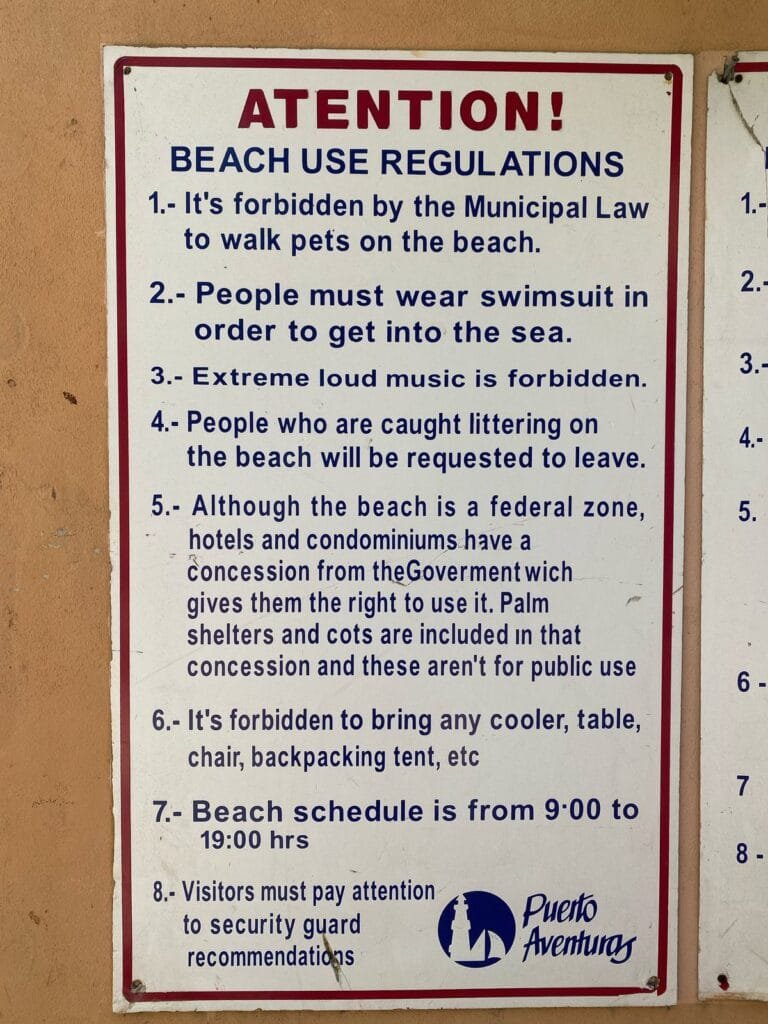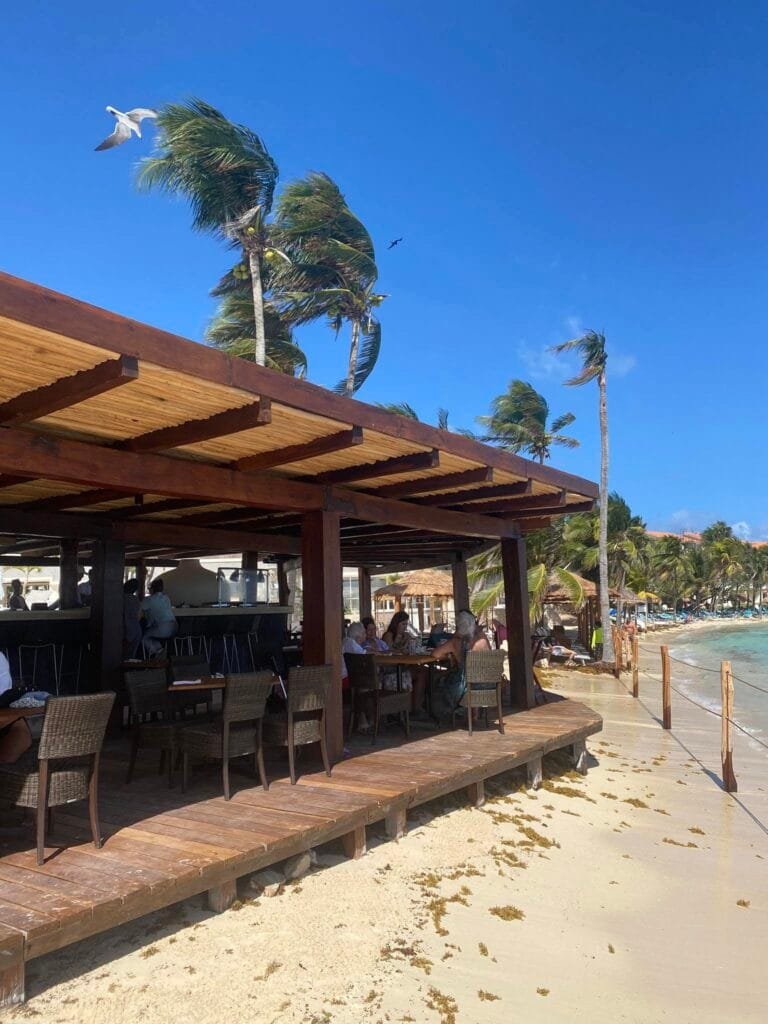Puerto Aventuras, Q. Roo — Controversy is mounting in Puerto Aventuras as residents and visitors accuse the Puerto Aventuras Hotel & Beach Club of illegally restricting public access to the beach—a right that is guaranteed under Mexican law.
Dozens of social media posts and eyewitness accounts from the past few weeks describe people being stopped at the access point beside the hotel for carrying personal beach gear such as folding chairs, umbrellas, coolers, and even drinks. In some cases, visitors were told they could only enter the beach if they paid to use the facilities of the beach club itself.
“It’s $40 USD for a chair, $35 for an umbrella, and $6 per beer,” one commenter noted. “And if you don’t pay, you don’t sit.”
Actual rates provided by the beach club indicate that there is a minimum spend of 350 MXN to enter the facilities which can be used for credit in the restaurant and bar areas. Use of the loungers and umbrellas at the pool costs 500 MXN and a space under tha palapas on the beach is 1000 MXN. Food and drink are additional.
“I was carrying two beach chairs, a purse, a small umbrella, and a cooler with juice—not alcohol—and I was turned away,” said one regular visitor from Canada. “We love the beach here, but if this is the way it’s going to be, we won’t come back next year.”
The beach in question is located along Fatima Bay, one of the only stretches of sand within this gated seaside community and a selling point for developers and homeowners who rent their properties vacationally. While the Puerto Aventuras Hotel & Beach Club has operated along the bay for years, recent management changes appear to coincide with stricter enforcement of entry rules—rules many argue are unlawful.

Public by Law
According to Article 8 of Mexico’s Ley General de Bienes Nacionales (General Law of National Assets), all beaches in Mexico are public by law, defined as the area 20 meters inland from the high tide line. This zone, known as the Zona Federal Marítimo Terrestre (ZOFEMAT), is federal property and cannot be privatized under any circumstances.
Access to that public zone must also be guaranteed. Article 149 of the same law states that local governments and concession holders must provide free and unobstructed access to beaches via public pathways. Denying that access, either directly or indirectly (for example, by blocking it based on what someone is carrying), is a violation of federal law.
In 2020, reforms were passed to strengthen enforcement of beach access rights. The updated law introduced penalties for businesses or individuals who obstruct public entry to beaches, including fines up to 1 million pesos and potential criminal charges for repeat offenders.
Concession not Ownership
While beachfront hotels, restaurants, and clubs may operate under what’s called a “beach concession,” it does not give them ownership of the federal zone. A concession is a type of lease granted by the federal government, through SEMARNAT (the Ministry of Environment and Natural Resources), that allows private entities to use the federal zone for a specific purpose—typically tourism-related activities.
Concession holders must meet strict conditions:
- They cannot restrict access to the beach.
- They cannot erect permanent barriers that obstruct the federal zone.
- They cannot require payment or consumption fees for the right to access or remain within the public beach area.
- They are obligated to respect the public nature of the beach, even if their business activities take place within or adjacent to it.
Any structures—such as fences, lounge areas, or palapas—must be temporary, removable, and within zoning regulations.

Local Backlash
Within Puerto Aventuras, the outcry has been swift. Community members, including full-time residents, renters, and local business owners, have called for intervention by PROFEPA, the federal environmental agency responsible for enforcing land use in the Federal zone.
Many say the changes are undermining the character of the town, which has long marketed itself as a family-friendly, walkable community with shared spaces and beach access.
“This isn’t just about beach chairs,” said one longtime resident. “We used to grab breakfast at the Beach Club, meet friends, bring our kids to the sand—it was a community space. Now it feels like we’re being pushed out of our own neighborhood.”
Some residents suspect the new Beach Club management may be targeting only certain groups—locals, seasonal renters, or families—while catering to higher-spending tourists. Others are worried that the Beach Club may be counting on confusion around land rights and concessions to enforce policies that simply don’t hold up under scrutiny.
“To add insult to injury, the guard blocking entry to the beach isn’t even a hotel employee,” remarked a local business owner. “He works for Colonos—our homeowners association— and his salary is paid by the very people he is charged with keeping off the beach—us!”
Calls for Action
Several members of the community say they’ve filed formal complaints with PROFEPA and are encouraging others to do the same. There’s growing pressure on local authorities and the governor of Quintana Roo to intervene and ensure that the federal laws protecting beach access are upheld.
Meanwhile, some residents have taken matters into their own hands. “I just walked past the security guy with my chair and umbrella,” one woman posted. “It’s a public beach. Let them call the police—I’ll wait.”
Discover more from Riviera Maya News & Events
Subscribe to get the latest posts sent to your email.

